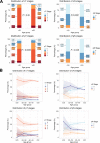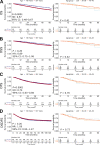Treatment Patterns and Outcomes of Preoperative Neoadjuvant Radiotherapy in Patients with Early-onset Rectal Cancer
- PMID: 37035581
- PMCID: PMC10078624
- DOI: 10.1158/2767-9764.CRC-22-0385
Treatment Patterns and Outcomes of Preoperative Neoadjuvant Radiotherapy in Patients with Early-onset Rectal Cancer
Abstract
Preoperative radiotherapy for early-stage rectal cancer has risks and benefits that may impact treatment choice in young patients. We reviewed radiotherapy use and outcomes for rectal cancer by age. Patients with early-stage rectal cancer in the Canadian province of British Columbia from 2002 to 2016 were identified (n = 6,232). Baseline characteristics, treatment response, overall survival (OS), disease-free survival (DFS), disease-specific survival (DSS), and locoregional recurrence rate (LRR) were compared between patients <50 (early-onset; n = 532) and ≥50 years old (average-onset; n = 5,700). Early-onset patients were more likely to receive preoperative chemoradiotherapy than short-course radiotherapy [OR, 2.20; 95% confidence interval (CI), 1.67-2.89; P < 0.0001], but also had higher nodal (P = 0.00096) and overall clinical staging (P = 0.033). Cancer downstaging and pathologic complete response rates were similar in those receiving neoadjuvant chemoradiotherapy by age. Early-onset and average-onset patients had similar DSS (P = 0.91) and DFS (P = 0.27) in multivariate analysis unless non-colorectal deaths, which were higher in older patients, were censored in the DFS model (HR, 1.30; 95% CI, 1.01-1.68; P = 0.042). LRR also did not differ between age groups (P = 0.88). Outcomes did not differ based on radiotherapy type. Young patients with rectal cancer are more likely to present with higher staging and receive long-course chemoradiotherapy. DSS did not differ by age group; however, young patients had worse DFS when we censored competing risks of death in older patients.
Significance: This population-based study suggests younger patients are more likely to receive chemoradiotherapy, potentially due to higher stage at diagnosis, and response is comparable by age.
© 2023 The Authors; Published by the American Association for Cancer Research.
Figures



References
-
- Siegel RL, Torre LA, Soerjomataram I, Hayes RB, Bray F, Weber TK, et al. Global patterns and trends in colorectal cancer incidence in young adults. Gut. 2019;68:2179–85. - PubMed
-
- Cammà C, Giunta M, Fiorica F, Pagliaro L, Craxì A, Cottone M. Preoperative radiotherapy for resectable rectal cancer: a meta-analysis. JAMA 2000;284:1008–15. - PubMed
-
- Swedish Rectal Cancer Trial, Cedermark B, Dahlberg M, Glimelius B, Påhlman L, Rutqvist LE, et al. Improved survival with preoperative radiotherapy in resectable rectal cancer. N Engl J Med 1997;336:980–7. - PubMed
-
- Kapiteijn E, Marijnen CAM, Nagtegaal ID, Putter H, Steup WH, Wiggers T, et al. Preoperative radiotherapy combined with total mesorectal excision for resectable rectal cancer. N Engl J Med 2001;345:638–46. - PubMed
Publication types
MeSH terms
LinkOut - more resources
Full Text Sources

